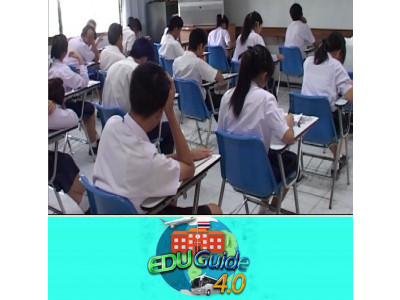ข่าวการศึกษา ศาสนา วัฒนธรรม
ดูบทความทั้งหมด
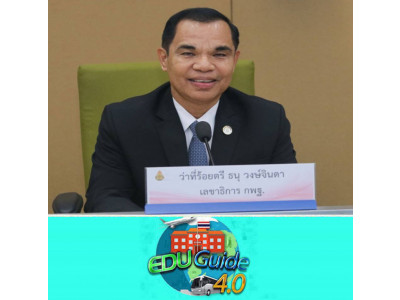
"ธนุ"แจง สพฐ.ให้อิสระ สพท.-ร.ร.ซื้อหนังสือเรียนปีการศึกษา 67
"ธนุ"แจงให้อิสระ สพท.-ร.ร.ซื้อหนังสือเรียนปี'67
ยึด'โปร่งใส-แข่งขันอย่างเป็นธรรม-ตรวจสอบได้'
เปิดช่องทาง...
อ่านต่อ

ก.ค.ศ.พบครูฯบางรายส่อลอกผลงานคนอื่นเสนอขอวิทยฐานะ
ก.ค.ศ.พบครูฯบางรายส่อลอกผลงานวิชาการคนอื่นเสนอขอวิทยฐานะ
ส่งต้นสังกัดสอบแล้ว-ถ้าผิดจริงฟันวินัยร้ายแรง
เตรีย...
อ่านต่อ

เด็ก ม.ปลายส่วนใหญ่ตกกราวรูด สอบคณิต-วิทย์ A-Level เข้ามหา'ลัย 67
เด็ก ม.ปลายส่วนใหญ่ตกกราวรูดอีกแล้ว!
สอบวิชาทาง "คณิต-วิทย์" A-Level เข้ามหา'ลัย 67 คะแนนเฉลี่ยตกต่ำเหมือนเดิม
เมื่อ...
อ่านต่อ

เผยร่างปฏิทิน สอศ.เปิดสอบครูผู้ช่วย ว.16-17 ชงให้โอกาส จนท.สมัครด้วย
ร่างปฏิทิน สอศ.เปิดคัดเลือกครูผู้ช่วย ว.16-17
สมัครเดือน พ.ค.-สอบภาค ก,ข เดือน ก.ค.
รอ ก.ค.ศ.เคาะปลาย เม.ย.นี้-...
อ่านต่อ

"ธนุ"แก้ปัญหา ร.ร.ขนาดเล็กไร้อัตรา ตน.ผู้อำนวยการสถานศึกษาอื้อ!
"ธนุ"แก้ปัญหา ร.ร.ขนาดเล็กไร้อัตรา ตน.ผู้อำนวยการ
ให้ สพท.ตั้ง ผอ.ร.ร.ใกล้เคียงไปรักษาการ-ลดภาระครู
เมื่อวันที่ 14 เ...
อ่านต่อ

ศาลปกครองนครศรีฯคุ้มครองชั่วคราว ห้าม สพป.สั่ง ขรก./ลูกจ้างอยู่เวร
ศาลปกครองนครศรีธรรมราชคุ้มครองชั่วคราว
ห้าม สพป.สั่ง ขรก.-ลูกจ้างอยู่เวรรักษาการณ์
EduGuide 4.0 รายงานข่าว&nbs...
อ่านต่อ
ภาพเป็นข่าว
ดูบทความทั้งหมด

"สกร.นครพนม"จัดงานวันรักการอ่านคึกคัก!
สำนักงานส่งเสริมการเรียนรู้ (สกร.) จังหวัดนครพนม จัดกิจกรรมงาน "2 เมษายน วันรักการอ่าน Open House 2024 เปิดบ้าน 3 ดี...
อ่านต่อ
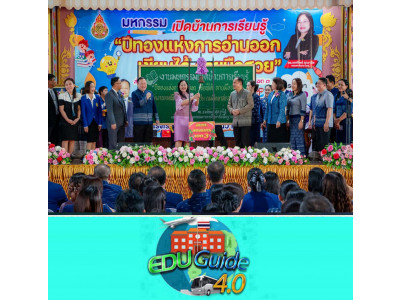
"ดร.เกศทิพย์"ปลื้ม สพป.สกลนคร เขต 3 จัดงานปีทองการอ่านออก เขียนได้ฯ
ดร.เกศทิพย์ ศุภวานิช รองเลขาธิการคณะกรรมการการศึกษาขึ้นพื้นฐาน (กพฐ.) เดินทางไปเป็นประธานเปิดงานมหกรรมเปิ...
อ่านต่อ

ประชุม อ.ก.ค.ศ.เขตพื้นที่การศึกษามัธยมศึกษานครศรีธรรมราช
นายอรรถพล ตรึกตรอง อดีตผู้ตรวจราชการกระทรวงศึกษาธิการ เป็นประธานการประชุมคณะอนุกรรมการข้าราชการครูและบุคลากรทางการศึกษ...
อ่านต่อ

สมศ.เตรียมการประเมินภายนอกสถานศึกษาอาชีวะ ปี 2567-2571
นายประเวศ ยอดยิ่ง ผู้ทรงคุณวุฒิในแวดวงอาชีวศึกษาไทย ได้โพสต์ลงเฟซบุ๊ก Prawed Yodying เข้าร่วมการอบรมเชิงปฏิบัติการเพื่...
อ่านต่อ
บทความ/รายงานพิเศษ
ดูบทความทั้งหมด

ก้าวสู่หนึ่งทศวรรษ ถนนสายวัฒนธรรม...เขมราษฎร์ธานี
ก้าวสู่หนึ่งทศวรรษ ถนนสายวัฒนธรรม...เขมราษฎร์ธานี
รายงานพิเศษโดย: ปัญญา แพงเหล่า
ความเป็นมา: 199 ปี อำเภอเขมราฐ...
อ่านต่อ

พลิกฟื้นแก่งสะพือ! ดับร้อน"มหาสงกรานต์" รับมรดกโลก ตลอดเมษาฯ 67
อุบลราชธานี พลิกฟื้นแก่งสะพือและสายน้ำ ในรอบ 30 ปี
จัด "มหาสงกรานต์" รับมรดกโลก ตลอดเดือนเมษาฯ 67
รายงานพิเศษโดย :&...
อ่านต่อ

ทำไม? เด็กอ่านไม่ออกเขียนไม่ได้
ทำไม? เด็กอ่านไม่ออกเขียนไม่ได้
EduGuide 4.0 ขออนุญาตแชร์ต่อข้อเขียนเรื่อง "ทำไม? เด็กอ่านไม่ออกเขียนไม่ได้" ซึ่งเผยแ...
อ่านต่อ

"ปธ.เครือข่ายคนรักษ์อาชีวะ"เตือนสติบิ๊ก ขรก.ศธ.! ต้นเหตุการศึกษาไทยไม่พัฒนา
มุมมอง.."ประธานเครือข่ายคนรักษ์อาชีวะ"
"..ดีครับนาย ได้ครับผม เหมาะสมกับท่าน.."
เตือนสติบิ๊ก ขรก.ศธ.! ต้นเหตุการศึกษ...
อ่านต่อ
โทรโข่ง EduGuide
ดูบทความทั้งหมด

โซเชียลครู! รำพึงบัญชีเงินเดือนใหม่ คนเก่าบรรจุก่อน..ผิดตรงไหน?
โซเชียลครู! รำพึงบัญชีเงินเดือนใหม่
คนเก่าบรรจุก่อน..ผิดตรงไหน?
ทำไมไม่ได้ปรับขึ้น
เมื่อวันที่ 5 เมษาย...
อ่านต่อ

สพม.กทม.เขต 1 จัดกิจกรรม "ห้องน้ำเท่าเทียม"ครู-น.ร." ใน 67 ร.ร.
ดร.นิยม ไผ่โสภา ผู้อำนวยการสำนักงานเขตพื้นที่การศึกษามัธยมศึกษา (สพม.) กรุงเทพมหานคร เขต 1 เปิดเผยกับ EduGuide 4.0 ว่า...
อ่านต่อ

มีจริงเหรอ? ผอ.ร.ร.สั่งให้ทุจริตผลสอบ NT "คะแนนอย่าให้ต่ำ"
คอลัมน์ "โทรโข่ง EduGuide" ขอแชร์ต่อโพสต์เฟซบุ๊ก (อาจารย์วิริยะ Wiriyah Eduzones) ในเฟซบุ๊ก ก...
อ่านต่อ

ข่าวดี"ครู ร.ร.ห่างไกล"! เลขาธิการ ก.ค.ศ.จ่อชงขอให้มีค่าตอบแทนพิเศษ
คอลัมน์ "โทรโข่ง EduGuide" ขอแชร์ต่อข่าวดีๆ สำหรับครูในโรงเรียนขนาดเล็กที่อยู่ห่างไกล จากโพสต์เฟซบุ๊ก (อาจารย์วิร...
อ่านต่อ
EduGuideToon
ดูบทความทั้งหมด

ใช่เหรอ??? "ผอ.เขต" ยุคนี้! สวย หล่อ...แต่ปากจัด
ตกเป็นกระแสวิพากษ์วิจารณ์มาเป็นระยะๆ ในห้วงเวลาหลายเดือนมานี้ กรณีเกิดเหตุไม่ลงรอยกันระหว่างผู้บริหารสำนักงานเขตพื้นที...
อ่านต่อ
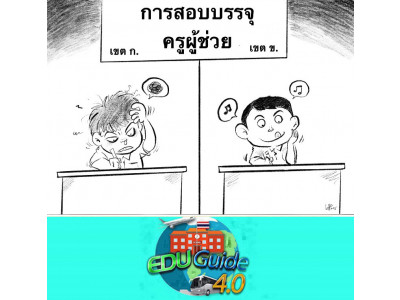
ข้อสอบ "ครูผู้ช่วย" สังกัด สพฐ. รอบทั่วไป 2566 ยุค "สองมาตรฐาน" ???
EduGuide 4.0 รายงานข่าวมาอย่างต่อเนื่องเรื่องการสอบแข่งขันเพื่อบรรจุและแต่งตั้งบุคคลเข้ารับราชการเป็นข้าราชการครู...
อ่านต่อ

เราจะสอน "ประชาธิปไตย" ในโรงเรียนกันอย่างไรดี...?!?!?!?
ท่ามกลางสถานการณ์การจัดตั้งรัฐบาลใหม่ ที่ยังคงมีการพูดกันมากถึงรัฐบาลเสียงข้างมาก รัฐบาลเสียงข้างน้อย (ภายหลังการเลือก...
อ่านต่อ

ไปไหนๆ...ไปเรียน สกร.ค่ะ/ครับ 555
การทยอยปลดป้ายเปลี่ยนชื่อสำนักงานส่งเสริมการศึกษานอกระบบและการศึกษาตามอัธยาศัย (กศน.) และหน่วยงานในสังกัด ไปเป็นก...
อ่านต่อ
รายการ EduGuide 4.0
ดูบทความทั้งหมด

EduGuide 4.0 พาชม สพฐ.ทึ่งผลลัพธ์ครูต้นแบบ Active Learning-GPAS 5 Steps
สพฐ.ทึ่งผลลัพธ์ครูต้นแบบ Active Learning ด้วยกระบวนการ GPAS 5 Steps
เด็กปฐมวัยเกิดกระบวนการคิด-สร้างนวัตกรรมได้
สอด...
อ่านต่อ

EduGuide 4.0 พาชมเคล็ดไม่ลับ! กระตุก ศธ.พัฒนา"ฟุตฟิตฟอไฟ"คนไทย
EduGuide 4.0 พาไปชมเคล็ดไม่ลับ!
กระตุก ศธ.พัฒนา"ฟุตฟิตฟอไฟ"คนไทย
สืบเนื่องจากที่สถาบันการศึกษาภาษาอังกฤษ Educa...
อ่านต่อ

พาเรียนรู้ GPAS 5 Steps เทคนิคสอน น.ร.ให้ฉลาด (ลดฟัง อ่าน ท่อง)
EduGuide 4.0 พาเรียนรู้กระบวนการสอนนักเรียนให้ฉลาดทันยุคศตวรรษที่ 21 ในงานนิทรรศการและการประกาศผลรางวัลนวัตกรรม GPAS 5...
อ่านต่อ

สพป.พิจิตร MOU พว. ปูพื้น"นวัตกรน้อย" ภายใน 2 ปี
EduGuide 4.0 พาชมพิธีลงนามว่าด้วยการส่งเสริมพัฒนาคุณภาพการศึกษาที่เน้นกระบวนการเรียนการสอนแบบผู้เรียนสร้า...
อ่านต่อ
How to ปฏิรูปการศึกษาไทย
ดูบทความทั้งหมด
EduGuide 4.0 กระตุกต่อมคิด
ดูบทความทั้งหมด
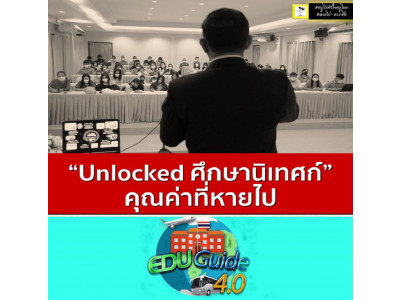
ไขคำตอบ! ทำไมครูเมินสมัครตำแหน่งศึกษานิเทศก์
เมื่อวันที่ 15 เมษายน 2567 คอลัมน์ "EduGuide 4.0 กระตุกต่อมคิด" ขออนุญาตแชร์ต่อข้อเขียน "Unlocked ศึกษานิเทศก์ จาก...
อ่านต่อ

จากอดีตถึงปัจจุบัน! โรงเรียนขนาดเล็กและครูอัตราจ้าง..อยู่ได้เพราะผ้าป่า?
เมื่อวันที่ 14 เมษายน 2567 คอลัมน์ "EduGuide 4.0 กระตุกต่อมคิด" ขอแชร์ต่อโพสต์เฟซบุ๊กของคนในแวดวงการศึกษาที่...
อ่านต่อ

อิงงานวิจัย! ผอ.ร.ร. 12 แบบ ที่ครูใฝ่ฝัน
นายวิริยะ ฤาชัยพาณิชย์ กรรมการผู้ทรงคุณวุฒิ ในคณะกรรมการการศึกษาขั้นพื้นฐาน (กพฐ.) ได้โพสต์เฟซบุ๊ก (อาจารย์วิริยะ Wiri...
อ่านต่อ

"ครูไทย" ท้อทำเอกสาร! ต้องลาออกอีกกี่คน จึงจะเกิดการเปลี่ยนแปลง
คอลัมน์ "EduGuide 4.0 กระตุกต่อมคิด" ขอนำเสนอโพสต์ข้อความของผู้ใช้นาม ครรชิต มนูญผล ผู้เชี่ยวชาญด้านการเรียนรู้ A...
อ่านต่อ
สาระน่ารู้
ดูบทความทั้งหมด

ทิพยประกันภัย ส่ง TIP Smart Assist บริการประชาชนเทศกาลสงกรานต์
ทิพยประกันภัย ส่งคาราวานน้ำใจ TIP Smart Assist มอบน้ำดื่มทิพย บริการประชาชนในช่วงเทศกาลสงกรานต์
EduGuide 4.0 รายงานข่...
อ่านต่อ

จว.สงขลาร่วมกับทิพยประกันภัย ส่งเสริมท่องเที่ยวไทยปลอดภัยข้ามแดน
จังหวัดสงขลา ร่วมกับ ทิพยประกันภัย และภาคีเครือข่าย เปิดตัวโครงการ “Safe Trip Safe Drive Cross Border To Thailan...
อ่านต่อ

ทิพยประกันภัย ร่วมกับ OR แจกประกันภัยอุบัติเหตุช่วงเทศกาลสงกรานต์
ทิพยประกันภัย ร่วมกับ OR เติมเต็มความห่วงใย แจกประกันภัยอุบัติเหตุสงกรานต์คลายร้อนให้แก่ลูกค้าพีทีที สเตชั่น ช่วง...
อ่านต่อ

TIP LADY โดย ทิพยประกันภัย จับมือ วาโก้ ลดโลกร้อน-ฝุ่นพิษ PM 2.5
TIP LADY โดย ทิพยประกันภัย จับมือ วาโก้ ตอกย้ำแนวคิด ESG
ปลุกพลังรักษ์โลก กับโครงการ “วาโก้บราเดย์ บราเก่าเราขอ...
อ่านต่อ









